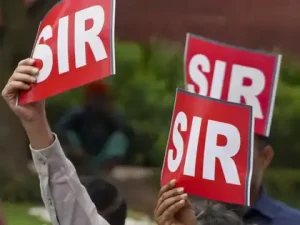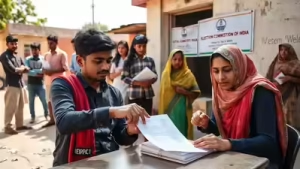The Supreme Court of India has issued a significant notice to the Election Commission, demanding a comprehensive explanation regarding the controversial deletion of 65 lakh names from Bihar’s electoral roll under the Bihar SIR (Special Intensive Revision) process. This judicial intervention comes following an application filed by the Association for Democratic Reforms, raising serious concerns about the transparency and legitimacy of the electoral revision exercise.
A bench comprising Justices Surya Kant, Ujjal Bhuyan, and N Kotiswar Singh has directed the Election Commission to furnish complete details by August 9 regarding the massive deletion of voters from Bihar’s draft electoral rolls. The Bihar SIR process has become a focal point of national attention, with political parties and civil society organisations questioning the methodology and rationale behind such extensive voter deletions.
 The Bihar SIR represents a comprehensive electoral roll revision exercise undertaken by the Election Commission ahead of the upcoming Bihar Assembly elections. On August 1, the Election Commission released the draft electoral rolls enlisting 7.24 crore voters, but simultaneously deleted more than 65 lakh names, claiming that most deleted voters had either died or migrated.
The Bihar SIR represents a comprehensive electoral roll revision exercise undertaken by the Election Commission ahead of the upcoming Bihar Assembly elections. On August 1, the Election Commission released the draft electoral rolls enlisting 7.24 crore voters, but simultaneously deleted more than 65 lakh names, claiming that most deleted voters had either died or migrated.
This Bihar SIR exercise has raised fundamental questions about electoral transparency and voter rights. The Association for Democratic Reforms has specifically challenged the Election Commission’s failure to provide individual reasons for each deletion, arguing that such mass removals without detailed justification violate democratic principles and constitutional provisions governing electoral processes.
The petition submitted to the Supreme Court highlights that the list of 65 lakh deleted electors fails to disclose reasons for non-submission of enumeration forms, despite the Election Commission possessing this information. This lack of transparency in the Bihar SIR process has prompted serious concerns about potential disenfranchisement of legitimate voters.
The Association for Democratic Reforms has emphasised that the Bihar SIR deletion process appears arbitrary and lacks the detailed documentation required for such significant electoral changes. The organisation argues that voters have a fundamental right to understand why their names have been removed from electoral rolls, particularly when such removals occur on such a massive scale.
The final electoral roll following the Bihar SIR process is scheduled for release on September 30, 2025, with Bihar Assembly elections expected in October or November 2024. This timeline creates urgency for resolving the controversy surrounding the voter deletions, as any delays could impact the electoral schedule.
Also Read: Remarkable Bihar SIR achieves 66.16% Enumeration and
Bihar Special Intensive Revision (SIR) 2025
The Bihar SIR controversy extends beyond administrative concerns to fundamental questions about electoral integrity. Political observers note that the deletion of such a substantial number of voters could potentially influence electoral outcomes, making judicial oversight crucial for maintaining democratic credibility.
The Supreme Court’s intervention in the Bihar SIR matter reflects the judiciary’s commitment to protecting electoral rights and ensuring transparency in democratic processes. The court has specifically directed the Election Commission to publish a full assembly constituency and booth-wise list of deleted electors with detailed reasons for non-inclusion.
This judicial scrutiny of the Bihar SIR process establishes important precedents for electoral transparency. The Supreme Court’s demand for comprehensive documentation sends a clear message that electoral authorities must maintain detailed records and provide justifiable reasons for any voter deletions.


Political analysts observe that the Bihar SIR issue highlights broader concerns about electoral transparency and the need for robust oversight mechanisms. The controversy underscores the importance of maintaining public confidence in electoral processes through transparent and accountable procedures.
The Bihar SIR challenge invokes fundamental constitutional principles regarding voting rights and electoral participation. The Supreme Court must determine whether the Election Commission’s Special Intensive Revision of electoral rolls in Bihar is arbitrary and unconstitutional, establishing important legal precedents for future electoral revisions.
 The legal framework governing the Bihar SIR process requires adherence to due process principles and transparency standards. The Association for Democratic Reforms argues that the current approach violates these standards by failing to provide adequate justification for voter deletions.
The legal framework governing the Bihar SIR process requires adherence to due process principles and transparency standards. The Association for Democratic Reforms argues that the current approach violates these standards by failing to provide adequate justification for voter deletions.
The Bihar SIR controversy highlights the need for comprehensive electoral reform to ensure transparency and accountability in voter list management. The Supreme Court’s intervention may establish new standards for electoral roll revisions, requiring detailed documentation and justification for any voter deletions.
This case emphasises the importance of maintaining accurate electoral rolls while protecting legitimate voters from arbitrary removal. The Bihar SIR process, regardless of its outcome, will likely influence future electoral practices and transparency requirements across India.
The Supreme Court’s notice to the Election Commission regarding the Bihar SIR deletion controversy represents a crucial moment for Indian electoral democracy. The demand for detailed explanations about 65 lakh voter deletions reflects the judiciary’s commitment to protecting electoral rights and ensuring transparent democratic processes.
As the Election Commission prepares its response to the Supreme Court’s directive, the Bihar SIR case will likely establish important precedents for electoral transparency and voter protection. The outcome of this judicial intervention will significantly impact future electoral roll management practices and strengthen democratic accountability mechanisms across the country.

